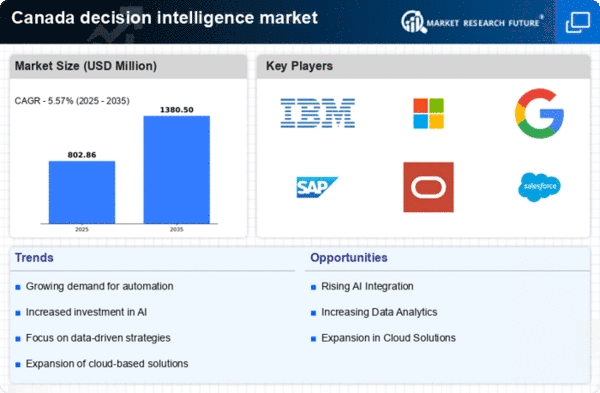Focus on Enhanced Customer Experience
In the decision intelligence market, the focus on enhancing customer experience is becoming increasingly prominent among Canadian businesses. Organizations are recognizing that understanding customer preferences and behaviors is crucial for driving loyalty and satisfaction. As a result, many are investing in decision intelligence tools that enable them to analyze customer data and tailor their offerings accordingly. Recent surveys indicate that approximately 60% of Canadian companies are prioritizing customer experience initiatives, which is likely to drive the demand for decision intelligence solutions. By leveraging advanced analytics and machine learning, businesses can create personalized experiences that resonate with their target audiences. This emphasis on customer-centric decision-making is expected to propel the growth of the decision intelligence market, as companies strive to differentiate themselves in a competitive landscape.
Integration of IoT and Big Data Analytics
The integration of Internet of Things (IoT) technologies and big data analytics is emerging as a pivotal driver for the decision intelligence market in Canada. As IoT devices proliferate, they generate vast amounts of data that organizations can harness to inform their decision-making processes. This convergence of IoT and big data analytics allows businesses to gain deeper insights into operational performance and customer behavior. For instance, industries such as manufacturing and retail are utilizing decision intelligence solutions to analyze data from connected devices, leading to improved efficiency and customer satisfaction. The decision intelligence market is likely to benefit from this trend, as organizations seek to capitalize on the insights derived from IoT data. The anticipated growth in IoT adoption, projected at 40% over the next few years, will further fuel the demand for decision intelligence solutions.
Regulatory Compliance and Risk Management
In the context of the decision intelligence market, regulatory compliance and risk management are emerging as critical drivers for adoption in Canada. As businesses face stringent regulations across various industries, the need for robust decision-making frameworks that ensure compliance is paramount. Organizations are increasingly turning to decision intelligence solutions to navigate complex regulatory landscapes and mitigate risks effectively. For instance, financial institutions are utilizing decision intelligence tools to enhance their risk assessment processes, thereby reducing potential liabilities. The market is projected to grow as companies invest in technologies that facilitate compliance and risk management, with an estimated increase of 25% in demand for such solutions over the next five years. This trend underscores the importance of integrating decision intelligence into corporate governance and operational strategies.
Advancements in Cloud Computing Technologies
The decision intelligence market in Canada is significantly influenced by advancements in cloud computing technologies. The shift towards cloud-based solutions is enabling organizations to access sophisticated decision intelligence tools without the need for substantial upfront investments in infrastructure. This accessibility is particularly appealing to small and medium-sized enterprises (SMEs), which are increasingly adopting decision intelligence solutions to enhance their competitive edge. Recent data indicates that the cloud computing market in Canada is expected to grow by 30% annually, which will likely correlate with increased adoption of decision intelligence technologies. As organizations leverage the scalability and flexibility of cloud solutions, the decision intelligence market is anticipated to expand, driven by the need for real-time data processing and collaborative decision-making capabilities.
Growing Demand for Data-Driven Decision Making
the decision intelligence market in Canada is experiencing a notable surge in demand for data-driven decisions.. Organizations across various sectors are increasingly recognizing the value of leveraging data analytics to enhance operational efficiency and strategic planning. According to recent statistics, approximately 70% of Canadian businesses are prioritizing data analytics initiatives to inform their decision-making processes. This trend is likely to propel the growth of the decision intelligence market, as companies seek advanced tools and technologies to transform raw data into actionable insights. The integration of machine learning and artificial intelligence into decision-making frameworks is becoming essential, as it allows organizations to predict trends and optimize outcomes. Consequently, the decision intelligence market is poised for expansion, driven by the necessity for businesses to remain competitive in an increasingly data-centric environment.
















